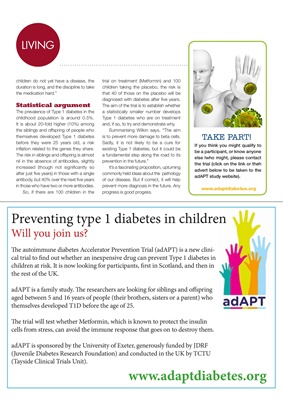
LIVINGLIVING
The autoimmune diabetes Accelerator Prevention Trial (adAPT) is a new clinical
trial to find out whether an inexpensive drug can prevent Type 1 diabetes in
children at risk. It is now looking for participants, first in Scotland, and then in
the rest of the UK.
adAPT is a family study. The researchers are looking for siblings and offspring
aged between 5 and 16 years of people (their brothers, sisters or a parent) who
themselves developed T1D before the age of 25.
The trial will test whether Metformin, which is known to protect the insulin
cells from stress, can avoid the immune response that goes on to destroy them.
adAPT is sponsored by the University of Exeter, generously funded by JDRF
(Juvenile Diabetes Research Foundation) and conducted in the UK by TCTU
(Tayside Clinical Trials Unit).
www.adaptdiabetes.org
Preventing type 1 diabetes in children
Will you join us?
children do not yet have a disease, the
duration is long, and the discipline to take
the medication hard."
Statistical argument
The prevalence of Type 1 diabetes in the
childhood population is around 0.5%.
It is about 20-fold higher (10%) among
the siblings and offspring of people who
themselves developed Type 1 diabetes
before they were 25 years old, a risk
inflation related to the genes they share.
The risk in siblings and offspring is almost
nil in the absence of antibodies, slightly
increased (though not significantly so
after just five years) in those with a single
antibody, but 40% over the next five years
in those who have two or more antibodies.
So, if there are 100 children in the
trial on treatment (Metformin) and 100
children taking the placebo, the risk is
that 40 of those on the placebo will be
diagnosed with diabetes after five years.
The aim of the trial is to establish whether
a statistically smaller number develops
Type 1 diabetes who are on treatment
and, if so, to try and demonstrate why.
Summarising Wilkin says, "The aim
is to prevent more damage to beta cells.
Sadly, it is not likely to be a cure for
existing Type 1 diabetes, but it could be
a fundamental step along the road to its
prevention in the future."
It's a fascinating proposition, upturning
commonly held ideas about the pathology
of our disease. But if correct, it will help
prevent more diagnosis in the future. Any
progress is good progess.
If you think you might qualify to be
a participant, or know anyone else
lwho might, please contact the trial
(click on the advert below to be
taken to their website).
www.adaptdiabetes.org
TAKE PART!